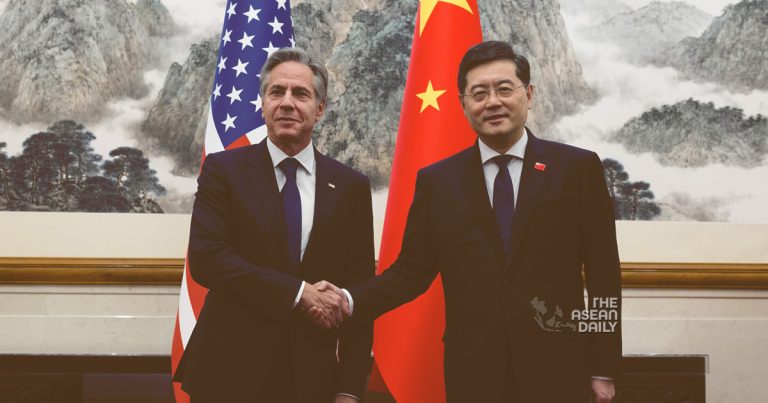19-6-2023 (BEIJING) The US Secretary of State, Antony Blinken, and the Chinese Foreign Minister, Qin Gang, engaged in a lengthy and candid discussion on Sunday, addressing their differences on various issues such as Taiwan and trade. While both sides expressed a desire for stable and predictable relations, they did not reach any substantial agreements beyond committing to continue the conversation and potentially holding a meeting in Washington.
During the 5-and-a-half-hour meeting followed by a dinner, Blinken stressed the importance of reducing the risk of misunderstandings and miscalculations in his talks with Qin Gang, according to the State Department. Qin, on the other hand, highlighted that Taiwan is of utmost importance to China and poses the greatest risk in the bilateral relationship, as reported by Chinese state media.
Before the talks, US officials had low expectations of any major breakthroughs given the long list of disputes between the two largest economies in the world. These disputes range from trade and US efforts to restrict China’s semiconductor industry to the status of Taiwan as a self-governed entity and Beijing’s human rights record.
The overall deterioration in US-China relations raises concerns of potential military clashes over Taiwan, which China claims as its own. The world closely watched Blinken’s visit, as any escalation between superpowers could have far-reaching global repercussions, affecting financial markets, trade routes, practices, and global supply chains.
Of particular concern to China’s neighbors has been Beijing’s reluctance to engage in regular military-to-military talks with Washington.
In a strikingly similar manner, both sides described the talks as useful, with a US spokesman characterizing them as “candid, substantive, and constructive,” and Chinese state media referring to them as “candid, in-depth, and constructive.” However, they did not appear to reach much consensus beyond the agreement that Qin should visit Washington at a mutually convenient time, without specifying the details.
Both sides emphasized the importance of facilitating visits for their citizens, with Chinese state media reporting that they agreed to discuss increasing passenger flights and welcoming more students and businesspeople.
Antony Blinken’s visit to China marks the first by a US Secretary of State in five years. It is expected to pave the way for further bilateral meetings between Washington and Beijing in the coming months, potentially involving Treasury Secretary Janet Yellen and Commerce Secretary Gina Raimondo. Moreover, it could set the stage for meetings between President Xi Jinping and President Joe Biden at multilateral summits later this year.
Upon Blinken’s arrival, Qin greeted him and his delegation at the door of a villa within the Diaoyutai State Guest House in Beijing, deviating from the usual protocol of meeting inside the building. As they entered, Qin engaged in small talk with Blinken, inquiring about his long journey from Washington. They then shook hands in front of the Chinese and American flags.
Hua Chunying, Assistant Foreign Minister of China, who is present at the meeting, tweeted a photo of Qin and Blinken shaking hands, expressing hope that the meeting would steer China-US relations back to what the two presidents agreed upon in Bali.
In November, President Biden and President Xi held long-awaited face-to-face talks on the sidelines of a summit of the Group of 20 major economies in Bali, engaging in frank discussions regarding Taiwan and North Korea, while also pledging to communicate more frequently.
During his stay in China until Monday, Blinken is expected to meet with China’s top diplomat, Wang Yi, and potentially President Xi Jinping.
US officials, briefing reporters after Sunday’s meetings, refrained from confirming whether Blinken would definitely meet President Xi or when Qin might visit Washington.
“If I had to choose one word to describe the exchange, it would be ‘direct,'” stated a senior State Department official. “Both sides expressed a desire to stabilize the relationship and prevent the competition between our two countries from escalating into conflict.”
According to state media, the Chinese foreign minister assured Blinken that China is committed to building a “stable, predictable, and constructive” relationship with the United States.
US officials have downplayed the prospects of any major breakthroughs during Blinken’s trip, but they have highlighted the primary goal of establishing open and durable communication channels to prevent the strategic rivalry between the two countries from escalating into conflict.




